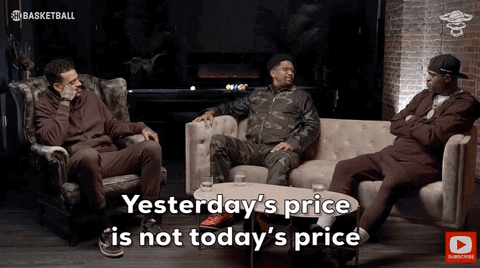Content hyperinflation
Generative AI tools look set to completely shake up the creator economy.
In our world of comms and marketing, we love a neat phrase - it's why the "creator economy" has caught on. It captures a bunch of disparate concepts into one neat little package. Your definition may differ slightly, but broadly the creator economy deals with the business of creation, people making money from (primarily) digital output and assets. And while the definition of a creator may be diffuse, “economy” gives the term its ballast. Economy is "a system especially of interaction and exchange". Creators give their time and their expertise; we give money or our attention (which content platforms transform into financial rewards for creators).
But a big question to ask ourselves in 2023 is whether the economics of the creator economy add up. And another, arguably more significant and more unknowable, question is how the rise of generative AI tools like ChatGPT will further distort these economics.
The Reuters Institute state of the media report is always an essential read, and its predictions (while probably wrong) are thought-provoking more often than not. This year they "expect to see a correction in the creator economy". Being the Reuters Institute for the Study of Journalism, they're looking at the creator economy through a media lens, particularly the rise of Substack journalists. But the point applies to the wide gamut of online creation.
The pressure to create is intense and relentless. Especially if your audience is dependent on algorithmic newsfeeds - you have to keep posting and keep up with the latest tweaks to those algorithms to ensure you don’t lose your reach. And if even you're on Substack or another more direct-to-subscriber platform, you'll likely be using social and content networks to cross-promote your work. What may seem effortless from the outside can be exhausting. And given just how uneven the financial rewards coming through to creators are, with a small percentage of power users taking home megabucks, while the rest subsist across a whole range of different income streams (including day jobs), it's probably fair to say we're reaching the end of the gold rush. Twitch, Instagram and others have recently announced changes to revenue sharing with creators - given the mass layoffs across the tech sector, it’s unsurprising to see the economics of the creator economy come into question. If the numbers in this New Yorker piece are true, paying out such sums simply for making simple Reels was never going to be sustainable for Meta.
Yes, the sample size is small in that New Yorker piece, but it highlights how creators could mine the short-lived but lucrative stream of face filter Reels on Instagram. What’s interesting is that they freely admit they didn't particularly enjoy making those Reels and didn't share them on their main feed; they shared them because the financial rewards were too big to ignore. At what point, when you're a million miles away from why you started sharing your work online, do you think, "why am I doing this?" At what point do you question the logic of chasing algorithmic rewards and the slot machine nature of the revenue it brings? Maybe never, and maybe the gambling element makes it attractive, but more creators may reconsider their approach sooner if the pool of money continues to dry up as it looks like doing in 2023.
And that's why I think the rise of generative tools makes these questions even more intriguing. As Ryan Broderick pointed out in the peerless
, you can easily imagine a world where "the internet's biggest platforms fill up with AI generative junk content" as creators chase the latest pay out that will guarantee them the most significant share of ad revenue. Many big platforms already engage in cat-and-mouse games with users, changing their algorithms regularly as creators and other "experts" identify ways to game the system and win more consistently - whether that's Google's search rankings or Instagram's newsfeed and explore algorithms.When those same creators have the power of generative AI tools behind them, their ability to quickly and exponentially test out different types of approaches to identify what works best will be vastly increased. They'll be able to more quickly jump on the trends and platform hacks that lead to greater success and remuneration. To stay ahead, the big platforms will need to react - either moving even more quickly in tweaking their algorithms or perhaps making what is already opaque and inscrutable even more so.
As
wrote last summer, there's no doubt that generative AI tools like ChatGPT are going to bring forth more posts - more text, more imagery, and more videos. But with creators stepping up their chase for a potentially dwindling pool of revenue, what does this mean for the economics of the creator economy? Under a classic supply-demand model, increased supply increases prices, exponentially reducing demand. A flooding of social networks with auto-generated posts attempting to jump on the latest trend might push the premium up of genuinely original posts from the most popular creators. But equally, it's not hard to see a hyperinflation effect happening on social posts and videos; there are just so many auto-generated posts filling content networks like an army of zombies that it devalues the whole sector, making the entire endeavour pointless for everyone.We're still at the early stages of generative AI tools - it's very much an experimentation phase as people try to apply them to all kinds of different ideas and workflows to see what sticks. And clearly, the tools themselves will get smarter as more people use them. But it's looking more and more likely that this is the next technological breakthrough the world has been waiting for. And that breakthrough looks set to shake up the creator economy more than any other area in the short term. Will be fascinating to see how it pans out.





